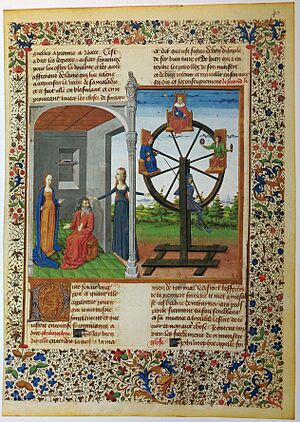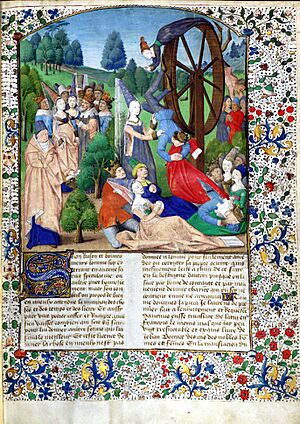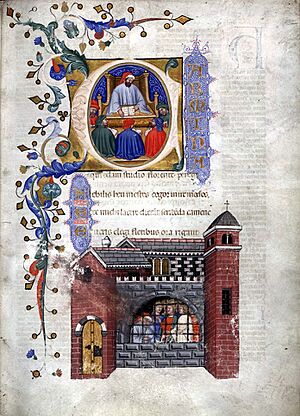On the Consolation of Philosophy facts for kids

Page from a 15th century French manuscript
|
|
| Author | Boethius |
|---|---|
| Translators |
|
| Language | Latin |
| Subject | Fate, Christian theology |
|
Publication date
|
524 |
|
Published in English
|
Mid-14th century (Middle English) |
| 082.1 | |
|
Original text
|
The Consolation of Philosophy at Script error: The function "name_from_code" does not exist. Wikisource |
| Translation | The Consolation of Philosophy at Wikisource |
The Consolation of Philosophy (which means "comfort from philosophy" in Latin) is a famous book written by a Roman philosopher named Boethius. He wrote it around 523 AD while he was in prison, waiting for a serious punishment from King Theodoric. Many people call it the last major book from the ancient world in the West. This book had a huge impact on thinking during the Medieval times and the early Renaissance.
Contents
Understanding The Consolation of Philosophy
Boethius wrote The Consolation of Philosophy in 523 AD. He was in prison for about a year, facing unfair charges from King Theodoric the Great. Boethius had been a very powerful person in Rome, holding an important job called magister officiorum. He was brought down by people who betrayed him.
This difficult experience led him to write the book. In it, he thinks about big questions like:
- How can bad things happen if God is in charge?
- How can someone still find happiness even when life is unfair?
- What are happiness and God really like?
In 1891, a scholar named Hugh Fraser Stewart said this book was "by far the most interesting example of prison literature the world has ever seen."
Boethius writes the book as a conversation. He talks with a character called "Lady Philosophy." She is like wisdom itself, appearing as a woman. Lady Philosophy tries to comfort Boethius. She explains that things like money, fame, and power don't last forever. She says that "no man can ever truly be secure until he has been forsaken by Fortune." This means true safety comes when you don't rely on luck.
Lady Philosophy argues that the best things are those of the mind. She calls these the "one true good." She believes that real happiness comes from inside you. She teaches that goodness is the only thing you truly own. It cannot be taken away by bad luck or changing circumstances.
Boethius also explores ideas about:
- Predestination and free will: Does God already know everything that will happen, or do people have the freedom to choose?
- The problem of evil: Why do bad things happen?
- Human nature: Boethius says people are good at heart. They only act badly when they give in to "wickedness," which makes them "sink to the level of being an animal."
- Justice: He believes that people who commit crimes should not be treated badly. Instead, they should be helped with understanding and respect. He compares it to a doctor helping a patient.
What Each Book Covers
The Consolation of Philosophy is divided into five parts, like chapters:
- Book I: Boethius is sad about being in prison. Then, Lady Philosophy visits him.
- Book II: Lady Philosophy explains that luck can change quickly. She talks about the "wheel of Fortune." She also says that real happiness comes from seeking wisdom.
- Book III: Building on earlier ideas, Philosophy explains that wisdom comes from a divine source. She shows how many earthly things, like money or beauty, don't last.
- Book IV: Philosophy and Boethius discuss good and evil. Philosophy offers reasons why bad things happen and why wicked people can never find true happiness.
- Book V: Boethius asks about the role of Chance in the world. Philosophy explains that Chance is guided by Providence (God's plan). Boethius then asks how God can know everything if people still have free will.
How the Book Influenced Others
From the time of Charlemagne through the Middle Ages and beyond, The Consolation of Philosophy was one of the most popular and important philosophical books. Many leaders, poets, historians, philosophers, and religious thinkers read it. Through Boethius, many ideas from the Classical period became known in the Western Medieval world. People often say Boethius was the "last of the Romans and the first of the Scholastics" (scholastics were medieval thinkers).
Many famous people translated the book into their own languages:
- King Alfred translated it into Old English.
- Jean de Meun translated it into Old French.
- Geoffrey Chaucer translated it into Middle English.
- Queen Elizabeth I translated it into Early Modern English.
- Notker Labeo translated it into Old High German.
The Consolation contains ideas that have appeared in many famous Western works:
- The wise female character influenced Dante.
- The idea of moving through different levels of the universe is similar to what Milton wrote.
- The balancing of opposite forces can be seen in Chaucer's The Knight's Tale.
- The "Wheel of Fortune" was a very popular idea throughout the Middle Ages.
Dante often quoted from it in his famous work, Divina Commedia. Dante even said about Boethius: "The blessed soul who exposes the deceptive world to anyone who gives ear to him."
Boethius's ideas are found almost everywhere in Geoffrey Chaucer's poetry. For example, in Troilus and Criseyde, The Knight's Tale, and The Clerk's Tale. Chaucer himself translated the work into English in his book Boece.
Some composers have used parts of the text in their music. The Italian composer Luigi Dallapiccola used it in his choral work Canti di prigionia (1938). The Australian composer Peter Sculthorpe quoted parts of it in his opera Rites of Passage (1972–73).
Tom Shippey wrote in The Road to Middle-earth that the way evil is shown in Tolkien's The Lord of the Rings is very "Boethian." Shippey says Tolkien knew King Alfred's translation of Boethius well. He points out "Boethian" comments from characters like Frodo, Treebeard, and Elrond.
Boethius and Consolatio Philosophiae are often mentioned by the main character Ignatius J. Reilly. This is in the book A Confederacy of Dunces (1980), which won a Pulitzer Prize.
The book is written in a special style called prosimetrum. This means it switches between sections of regular writing (prose) and sections of poetry. Boethius showed great skill in writing Latin poetry. It is also seen as a Menippean satire. This means it mixes an allegorical story, a platonic dialogue (like a conversation between philosophers), and lyrical poetry.
Edward Gibbon, a famous historian, called the work "a golden volume." He said it was "not unworthy of the leisure of Plato or Tully" (two very famous ancient philosophers).
In the 20th century, nearly four hundred copies of the original handwritten manuscripts still existed. This shows how popular the book was for a very long time.
C. S. Lewis, a well-known writer, said about the book: "To acquire a taste for it is almost to become naturalised in the Middle Ages." This means reading it helps you understand the thinking of that time.
Images for kids
-
Lady Fortune with the Wheel of Fortune in a medieval manuscript of a work by Boccaccio
See also
- Allegory in the Middle Ages
- Consolatio
- Girdle book
- Metres of Boethius
- Prosimetrum
- Stoicism
- The Wheel of Fortune






